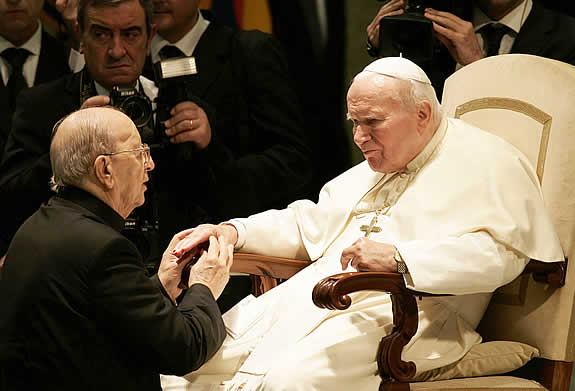By Richard P. McBrien
The Tidings
June 16, 2006
http://www.the-tidings.com/2006/0616/essays.htm
Last month the Vatican issued its decision on Father Marcel Maciel Degollado, founder of the Legionaries of Christ, who had been accused of sexual abuse by several former members. The Congregation for the Doctrine of the Faith did not expel Father Maciel from the priesthood out of regard for his advanced age (86), but it ruled that he can no longer exercise a public ministry in the Church and is to spend the remainder of his life quietly, in "prayer and penitence."
A series of copyrighted articles in The Hartford Courant in 1997 disclosed in some detail accusations of sexual abuse lodged against Father Maciel by nine former members of the Legion of Christ. Father Maciel and the Legion vehemently denied the charges and the Vatican, not surprisingly, refused to move the investigation forward.
 |
|
FOUNDER BLESSED --- Pope John Paul II blesses Father Marcial Maciel Degollado Nov. 30, 2004. REUTERS Photo by The Tidings Online |
"Not surprisingly," because Father Maciel and his Legionaries were a favorite of the late Pope John Paul II. During a trip to Mexico in 1994, the pope called him "an efficacious guide to youth," and in 1997 personally appointed him a representative to the Synod for the Americas.
What makes the Vatican's action against Father Maciel so devastating for the Legion is that he was not simply its founder. According to the full-length expose by reporters Jason Berry and Gerald Renner, "Vows of Silence" (Free Press, 2004), Legionaries take vows never to speak ill of Father Maciel or their other superiors, and to report any member who does.
At a public audience on Nov. 30, 2004, he praised Father Maciel on the occasion of his 60th anniversary of ordination. And in January 2005, just three months prior to his death, John Paul II once again thanked Father Maciel for his "paternal affection and his experience."
Founded in 1941, the Legion of Christ has 650 priests and 2,500 seminarians in 20 countries, and 50,000 members in its lay affiliate, Regnum Christi ("Vatican Disciplines Founder of Order Over Abuse Charges," New York Times, May 20). It also operates boarding schools for boys interested in the priesthood in New Hampshire, California, and, most recently, in the diocese of Gary, Indiana.
The group's headquarters is in Orange, Connecticut, and it also has a seminary in nearby Cheshire. The Legion is said to have a dozen universities, including one in Rome and its newest in the United States, the University of Sacramento.
In every instance, the Legion has secured the permission of the local bishop, but its relations with other bishops have been rocky, to say the least. The Legionaries were expelled from the diocese of Columbus, Ohio, in 2002 for allegedly disruptive activities in a parish school, and later from the archdiocese of St. Paul-Minneapolis for operating what Archbishop Harry Flynn has called a "parallel church" ("Minnesota archbishop bars Legionaries from his archdiocese," Catholic News Service, Dec. 22, 2004).
What makes the Vatican's action against Father Maciel so devastating for the Legion is that he was not simply its founder. According to the full-length expose by reporters Jason Berry and Gerald Renner, "Vows of Silence" (Free Press, 2004), Legionaries take vows never to speak ill of Father Maciel or their other superiors, and to report any member who does.
As Father James Martin, associate editor of the Jesuit weekly, America, has pointed out, "The distinctive [spirit] of the order comes from the founder. His life is studied, his words are quoted, his picture and statues are everywhere" (May 19, 2006).
The Vatican action against Father Maciel places the Legionaries in a very difficult position indeed. "It would be like teaching the Franciscans that they shouldn't talk about St. Francis," Father Martin said (Associated Press, May 20),
Reactions have varied among the original plaintiffs. Some view the Vatican's action as a form of personal vindication; others complain that the penalty is too lenient. But the reactions of Father Maciel, his community and some of his strongest supporters outside the Legion have been more uniform in their continued denials of guilt.
A statement released by the Legion from its Connecticut headquarters claimed that Father Maciel considers the Vatican decision "a new cross that God, the Father of Mercy, has allowed him to suffer and that will obtain many graces for the Legion of Christ."
He again professed his innocence, but "following the example of Jesus Christ, decided not to defend himself in any way."
Throughout the years, as allegations of sexual abuse against Father Maciel grew in number and forcefulness, several high-profile Catholics, usually identified as conservatives or ultra-conservatives, emphatically defended him. These included John Paul II's biographer, George Weigel, Harvard Law professor Mary Ann Glendon, William J. Bennett, William Donohue, head of the Catholic League, and Father Richard John Neuhaus, editor of First Things.
Father Neuhaus has refused to change his opinion. "It wouldn't be the first time that an innocent and indeed holy person was unfairly treated by church authority" (New York Times, May 20).
But "church authority" in this case is Pope Benedict XVI, in whose election last April Richard John Neuhaus had rejoiced.
Father Richard P. McBrien is the Crowley-O'Brien Professor of Theology at the University of Notre Dame.
Any original material on these pages is copyright © BishopAccountability.org 2004. Reproduce freely with attribution.